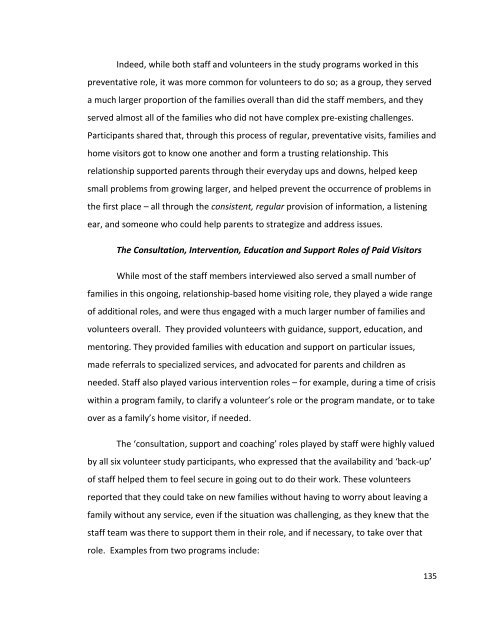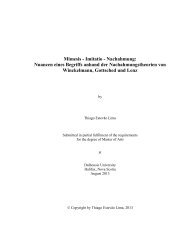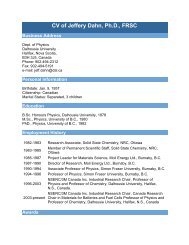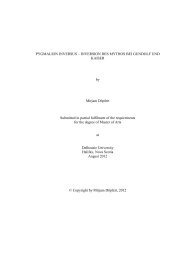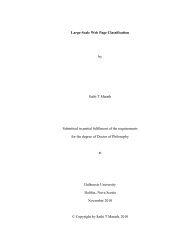- Page 1 and 2:
Greater Than the Sum of Its Parts:
- Page 3 and 4:
DALHOUSIE UNIVERSITY DATE: 25 Novem
- Page 5 and 6:
TABLE OF CONTENTS LIST OF TABLES ..
- Page 7 and 8:
4.4 SUMMARY .......................
- Page 9 and 10:
7.2.1 Identity (as perceived by par
- Page 11 and 12:
8.4.1 Allows for Successful Impleme
- Page 13 and 14:
LIST OF TABLES Table 1 Stages in th
- Page 15 and 16:
LIST OF ABBREVIATIONS USED CMP ECD
- Page 17 and 18:
II. Other terms used in this thesis
- Page 19 and 20:
V. Gender and language in this thes
- Page 21 and 22:
The many colleagues, friends, neigh
- Page 23 and 24:
However, while my search of the lit
- Page 25 and 26:
daunting challenges linked to mothe
- Page 27 and 28:
number of volunteer home visiting p
- Page 29 and 30:
self-control” (Richmond, 1930, p.
- Page 31 and 32:
fundamental to social work” (Inte
- Page 33 and 34:
Parents Volunteer Service [ESP], 20
- Page 35 and 36:
positive role models or people who
- Page 37 and 38:
and the intersection of various for
- Page 39 and 40:
A new measure of clarity and a deep
- Page 41 and 42:
Finally, a growing body of literatu
- Page 43 and 44:
However, with the exception of this
- Page 45 and 46:
Despite gains in women’s equality
- Page 47 and 48:
2.5 THE SERVICE DELIVERY CONTEXT: V
- Page 49 and 50:
2.6 GETTING IT RIGHT: COUNTRIES INV
- Page 51 and 52:
CHAPTER 3: REVIEW OF THE LITERATURE
- Page 53 and 54:
esults, most notably from Hawai’i
- Page 55 and 56:
3.2 PROGRAMS WITH PAID VISITORS 3.2
- Page 57 and 58:
particularly those that discuss and
- Page 59 and 60:
with quality early childhood educat
- Page 61 and 62:
…the researchers limited the para
- Page 63 and 64:
contradicted those of others; and,
- Page 65 and 66:
with a volunteer to a paid visitor
- Page 67 and 68:
the Board “was aware of models th
- Page 69 and 70:
Indeed, even in conducting the 2005
- Page 71 and 72:
visiting programs views a person in
- Page 73 and 74:
CHAPTER 4: THEORETICAL FRAMEWORK He
- Page 75 and 76:
wages, instability, and unpredictab
- Page 77 and 78:
home visiting programs vary tremend
- Page 79 and 80:
they are experiencing (and internal
- Page 81 and 82:
& Dubus, 2005). Women’s partners
- Page 83 and 84:
children, hampering their ability t
- Page 85 and 86:
C. What external and internal facto
- Page 87 and 88:
often include observation, observat
- Page 89 and 90:
1. In two of the study programs, th
- Page 91 and 92:
useful to those who want to learn m
- Page 93 and 94:
study. While I went into the study
- Page 95 and 96:
it would be necessary to omit detai
- Page 97 and 98:
Between February 2007 to April 2010
- Page 99 and 100:
5.7.2 Contacting Eligible Programs
- Page 101 and 102:
5.7.4 Confirming Agency Participati
- Page 103 and 104:
eadily confirmed that this was the
- Page 105 and 106: A report’s ability to allow reade
- Page 107 and 108: I also asked each Agency Contact Pe
- Page 109 and 110: question. While participants from o
- Page 111 and 112: CHAPTER 6: DESCRIPTION OF PROGRAMS
- Page 113 and 114: In the 12 local areas where it oper
- Page 115 and 116: and take onboard this Programme, to
- Page 117 and 118: volunteer explained: “You know, e
- Page 119 and 120: thought that the work could be cont
- Page 121 and 122: equires an unusually high level of
- Page 123 and 124: partnership is larger-scale, and mo
- Page 125 and 126: The Utah County Health Department n
- Page 127 and 128: oader goal of developing a multifac
- Page 129 and 130: order to help families get the supp
- Page 131 and 132: needs and concerns range from the s
- Page 133 and 134: Our range of socially inclusive ear
- Page 135 and 136: egarding one’s concerns, and addr
- Page 137 and 138: ‘Gateway,’ to serve families an
- Page 139 and 140: provided parents with extensive inf
- Page 141 and 142: Eight staff were interviewed. Four
- Page 143 and 144: 7.1 OVERVIEW OF FINDINGS Participan
- Page 145 and 146: Table 3: Responsibilities of paid s
- Page 147 and 148: of the other, allowing each to acco
- Page 149 and 150: the following sections, it was the
- Page 151 and 152: employed by a health or social agen
- Page 153 and 154: that front-line staff members be pu
- Page 155: wasn't breastfeeding, [staff member
- Page 159 and 160: manager could “be very flexible a
- Page 161 and 162: all families, regardless of socio-e
- Page 163 and 164: In all three programs, if a family
- Page 165 and 166: Researcher’s reflection These pro
- Page 167 and 168: 7.5 INCREASED COST-EFFECTIVENESS Se
- Page 169 and 170: the volunteers consistently express
- Page 171 and 172: There have been huge spin-offs for
- Page 173 and 174: 7.6.2 Orientated New Staff to the R
- Page 175 and 176: exactly what I am doing.” This kn
- Page 177 and 178: them to hone, maintain and pass on
- Page 179 and 180: have to ‘refer out,’ some famil
- Page 181 and 182: In comparison, Good Beginnings Aust
- Page 183 and 184: The manager stressed that the progr
- Page 185 and 186: Staff Members’ Work with Vulnerab
- Page 187 and 188: and passionate, I have included the
- Page 189 and 190: program as a whole, vis-a-vis havin
- Page 191 and 192: esidual system, eligibility criteri
- Page 193 and 194: post-partum home visit or telephone
- Page 195 and 196: Ironically, as documented in the Go
- Page 197 and 198: A Lack of Attention to Prevention A
- Page 199 and 200: Further, had health authorities inv
- Page 201 and 202: prioritize which families to serve
- Page 203 and 204: program], would it be possible? I d
- Page 205 and 206: that ... the resources would come t
- Page 207 and 208:
[good] ... I could see that.” The
- Page 209 and 210:
7.14.2 Managing Mixed-Delivery Prog
- Page 211 and 212:
One manager reflected that ‘meldi
- Page 213 and 214:
I. Programs could put to use, in co
- Page 215 and 216:
A staff member may have taken over
- Page 217 and 218:
expanding the number of families se
- Page 219 and 220:
countries in question, as a widespr
- Page 221 and 222:
Further, given that volunteer recru
- Page 223 and 224:
acts as a vehicle for starting disc
- Page 225 and 226:
services. However, participants fro
- Page 227 and 228:
for some families, particularly tho
- Page 229 and 230:
experienced paid staff member; volu
- Page 231 and 232:
these families, a disproportionate
- Page 233 and 234:
whereby those most at risk, and tho
- Page 235 and 236:
Indeed, through my correspondence a
- Page 237 and 238:
programs. The findings were filtere
- Page 239 and 240:
However, given the funding challeng
- Page 241 and 242:
8.7.4 Directions for Future Researc
- Page 243 and 244:
7. How is volunteer home visiting v
- Page 245 and 246:
CHAPTER 9: CONCLUSION In this chapt
- Page 247 and 248:
9.2 OVERVIEW: CHALLENGES OF MIXED-D
- Page 249 and 250:
Those considering such an approach
- Page 251 and 252:
likely to engage and maintain invol
- Page 253 and 254:
their parenting priorities; and by
- Page 255 and 256:
and for the future (Acton, 2005). F
- Page 257 and 258:
Bryce, H. (2000, August). Northern
- Page 259 and 260:
DePoy, E., & Gitlin, L. N. (1998).
- Page 261 and 262:
Heckman, J., & Carneiro, P. (2003,
- Page 263 and 264:
Matusicky, C., & Russell, C. C. (20
- Page 265 and 266:
Parents as Teachers (n.d.). Support
- Page 267 and 268:
The Benevolent Society (2009, Octob
- Page 269 and 270:
Appendix A: Introductory Letter to
- Page 271 and 272:
Information on Extra Support for Pa
- Page 273 and 274:
Continued - To be eligible to take
- Page 275 and 276:
Please note: The focus of this stud
- Page 277 and 278:
What is the purpose of this researc
- Page 279 and 280:
What, if anything, will we gain fro
- Page 281 and 282:
6. To designate an Agency Contact P
- Page 283 and 284:
Outline of Duties - Agency Contact
- Page 285 and 286:
In order to take part in this study
- Page 287 and 288:
Letter to eligible home visitors: I
- Page 289 and 290:
Appendix G: Information and Consent
- Page 291 and 292:
You can take part in this study if
- Page 293 and 294:
Confidentiality, continued: All re
- Page 295 and 296:
SIGNATURE PAGE (Agreement to take p
- Page 297 and 298:
Section I: Program History Particip
- Page 299 and 300:
(5F). Some questions about funding:
- Page 301 and 302:
5F. Some questions about funding: O
- Page 303 and 304:
8E. If you could change anything ab
- Page 305 and 306:
[Dalhousie University letterhead] A
- Page 307 and 308:
Program Feature Programs that parti


